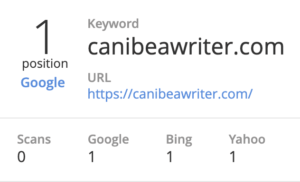In today’s digital age, having a visible website is essential for any business. A website is your online storefront, and it’s the first impression that potential customers will have of your business. If your website is not visible, it’s like having a store with no signage – no one will know it’s there.
 There are many benefits to having a visible website. First, it can help you attract new customers. When people search for products or services like yours, your website will show up in the search results if it’s optimized for search engines. This means that more people will be able to find you and learn about your business.
There are many benefits to having a visible website. First, it can help you attract new customers. When people search for products or services like yours, your website will show up in the search results if it’s optimized for search engines. This means that more people will be able to find you and learn about your business.
Second, a visible website can help you build brand awareness. When people visit your website, they’ll learn more about your business, your products, and your services. This can help you build trust and credibility with potential customers.
Third, a visible website can help you generate leads and sales. When people are interested in your products or services, they can easily contact you through your website. This can help you convert more visitors into customers.
Having a website is great, but it will only do you good if people can actually find your site. And that’s exactly why SEO (search engine optimization) exists! In this blog post, we’re going to give you step-by-step instructions on using Semper Plugins SEO tools to get your website discovered and boost its visibility online.
Introduction to SEO and Its Benefits
If you own a website, optimizing it for SEO (Search Engine Optimization) is one of the best ways to get your content out there and make sure that people are seeing what you have to offer. By leveraging SEO tools offered by Semper Plugins, such as their keyword research tool and blog post analyzer, you can strategically maximize visibility for your site. Through this step-by-step tutorial, we will walk through some basics of search engine optimization and its many advantages so that anyone can take full advantage of these powerful tools. So let’s get started!
Why use Semper Plugins SEO Tools?
When it comes to making sure your website is visible on the web, search engine optimization (SEO) tools are essential for success. Semper Plugins SEO Tools provides easy-to-implement solutions that you can leverage to maximize your visibility online and boost traffic levels significantly. From keyword research to improved page loading speeds, increased internal linking capabilities, and targeted content creation advice; there’s no stone left unturned when using a tool like this one from Semper Plugins!
Step-by-Step instructions for Optimizing Your Website with Semper Plugins:
Search engine optimization (SEO) can seem like a daunting task, but Semper Plugins SEO tools make the process easier and more accessible than ever before. In this step-by-step tutorial, we will walk you through how to use their plugins to ensure your website’s visibility while increasing your ranking results on search engines such as Google or Bing. By leveraging Semper Plugin’s state-of-the-art technical features, such as automatically-generated meta tags and keyword-optimized content creation – it is easy to fast-track your website a success!
Indeed, here are some essential tips on how to improve your website’s visibility and get found on Google through effective search engine optimization (SEO):
1. Keyword Research and Optimization:
– Conduct thorough keyword research to identify the terms and phrases your target audience is searching for.
– Optimize your content, including meta titles, meta descriptions, headings, and body text, with relevant keywords. Semper Plugins LLC
– Avoid keyword stuffing – focus on providing valuable, natural content.
2. High-Quality Content:
– Create well-written, valuable, and engaging content that addresses your audience’s questions and needs.
– Regularly update your content to keep it fresh and relevant.
3. Mobile-Friendly and Fast Website:
– Ensure your website is mobile-responsive and provides a great user experience across devices.
– Improve website loading speed to reduce bounce rates and improve user satisfaction.
4. Technical SEO:
– Optimize your website’s structure, URL format, and internal linking to make it easily navigable for users and search engines.
– Use descriptive URLs and include relevant keywords.
5. Backlinks and Authority:
– Build high-quality backlinks from reputable websites in your industry or niche.
– Create shareable content that naturally attracts backlinks.
6. Google My Business:
– If you have a physical location, claim and optimize your Google My Business listing. This is crucial for local SEO.
7. User Experience (UX):
– Prioritize a positive user experience by improving navigation, readability, and accessibility of your website.
– Use clear calls-to-action (CTAs) to guide users toward desired actions.
8. Social Signals:
– Maintain an active presence on social media platforms relevant to your business. Social signals can indirectly impact SEO.
9. Structured Data Markup:
– Implement structured data markup (schema markup) to help search engines understand the context of your content.
10. Regular Updates and Monitoring:
– Stay informed about search engine algorithm updates and adjust your strategy accordingly.
– Regularly monitor your website’s performance using tools like Google Analytics and Search Console.
11. Avoid Black Hat SEO Practices:
– Avoid using unethical practices like keyword stuffing, hidden text, or link farms. These can result in penalties from search engines.
12. Local SEO:
– Optimize for local searches by including location-specific keywords and getting local citations if you have a physical location.
Remember that SEO is a long-term strategy, and results may take time. It’s essential to be patient and consistent in your efforts.
Additionally, Google’s algorithms are complex and constantly evolving, so staying up-to-date with industry trends and best practices is crucial.
Consider seeking professional help if you need help with implementing SEO strategies on your own. Here is a general overview of SEO and the typical approach that guides like this might take:
Search Engine Optimization (SEO): SEO is optimizing a website’s content, structure, and elements to improve its visibility in search engine results. The goal is to rank higher in search engine results pages (SERPs) for relevant keywords, thus increasing organic (non-paid) traffic to the website. Your AIOSEO Black Friday Link
Typical Topics Covered in SEO Guides:
1. Keyword Research: Identifying the keywords and phrases your target audience will likely use when searching for products, services, or information related to your website.
2. On-Page SEO: Optimizing individual web pages for specific keywords. This includes optimizing meta titles, meta descriptions, headings, content, images, and internal linking.
3. Technical SEO: Ensuring your website is technically sound and search engine-friendly. This includes optimizing site speed, mobile responsiveness, URL structure, and fixing crawl errors.
4. Off-Page SEO: Building backlinks from reputable and relevant websites to improve your website’s authority and trustworthiness in the eyes of search engines.
5. Local SEO: If your business operates locally, optimize for local searches by claiming and optimizing Google My Business listings and getting reviews.
6. Content Strategy: Creating high-quality, relevant, and valuable content that attracts and engages your target audience. This can include blog posts, videos, infographics, etc.
7. Analytics and Monitoring: Use tools like Google Analytics to monitor your website’s performance, track user behavior, and adjust your SEO strategy accordingly.
8. Algorithm Updates: Staying up-to-date with search engine algorithm updates (e.g., Google’s updates) and adjusting your strategy to align with best practices.
Semper Plugins is a platform specializing in SEO solutions, plugins, or tools. Their approach focuses on WordPress-specific SEO enhancements, as plugins are often associated with WordPress sites.
For more information about “Get Found on Google with SEO: The Semper Plugins Way,” I recommend checking the official website of Semper Plugins or searching for reviews or summaries of the resource online.
Keep in mind that the field of SEO is dynamic, and strategies can change based on search engine algorithm updates and industry trends.
Moreover, I use Semper Plugins for my SEO. Semper LLC does a beautiful job guiding my strategies.
Kevin

